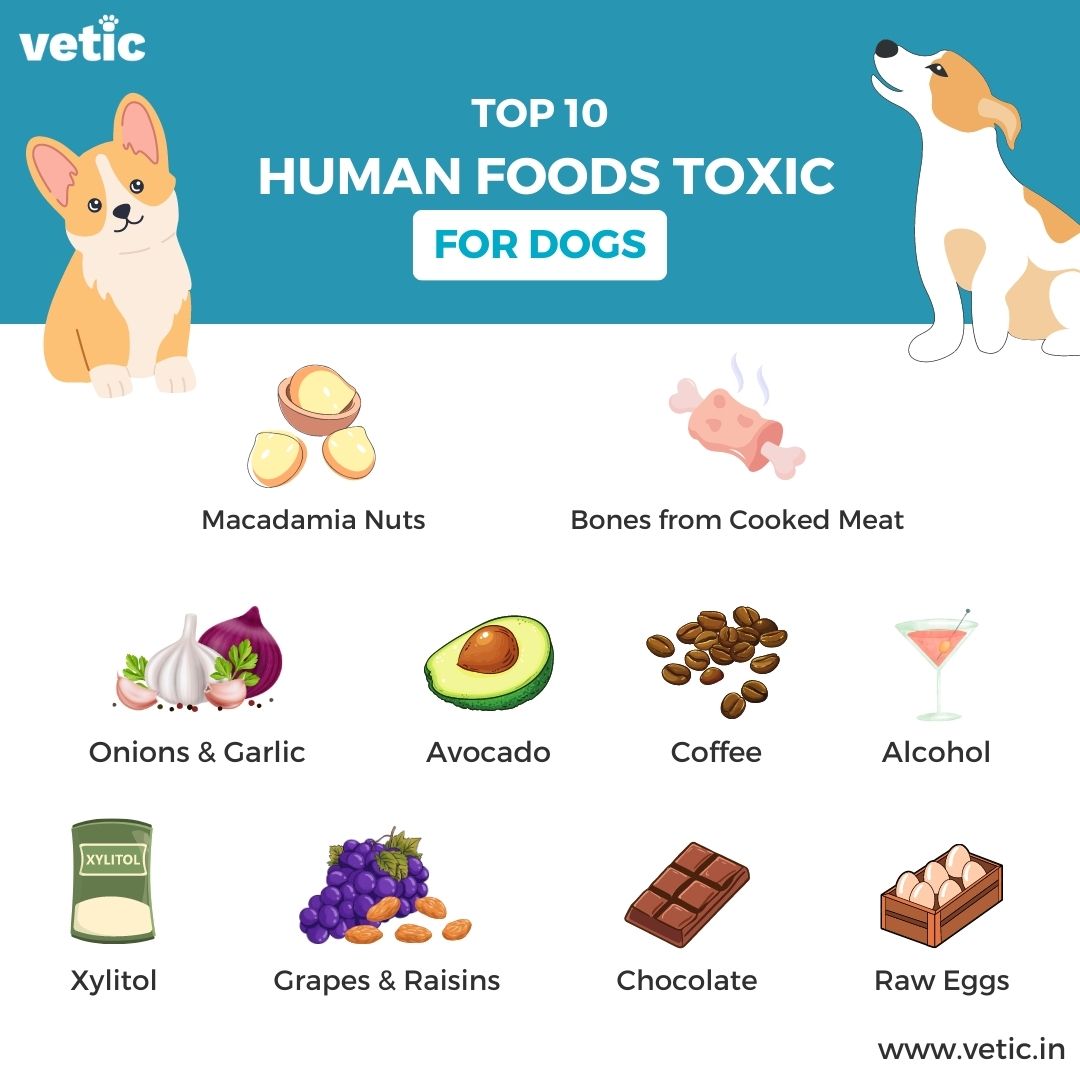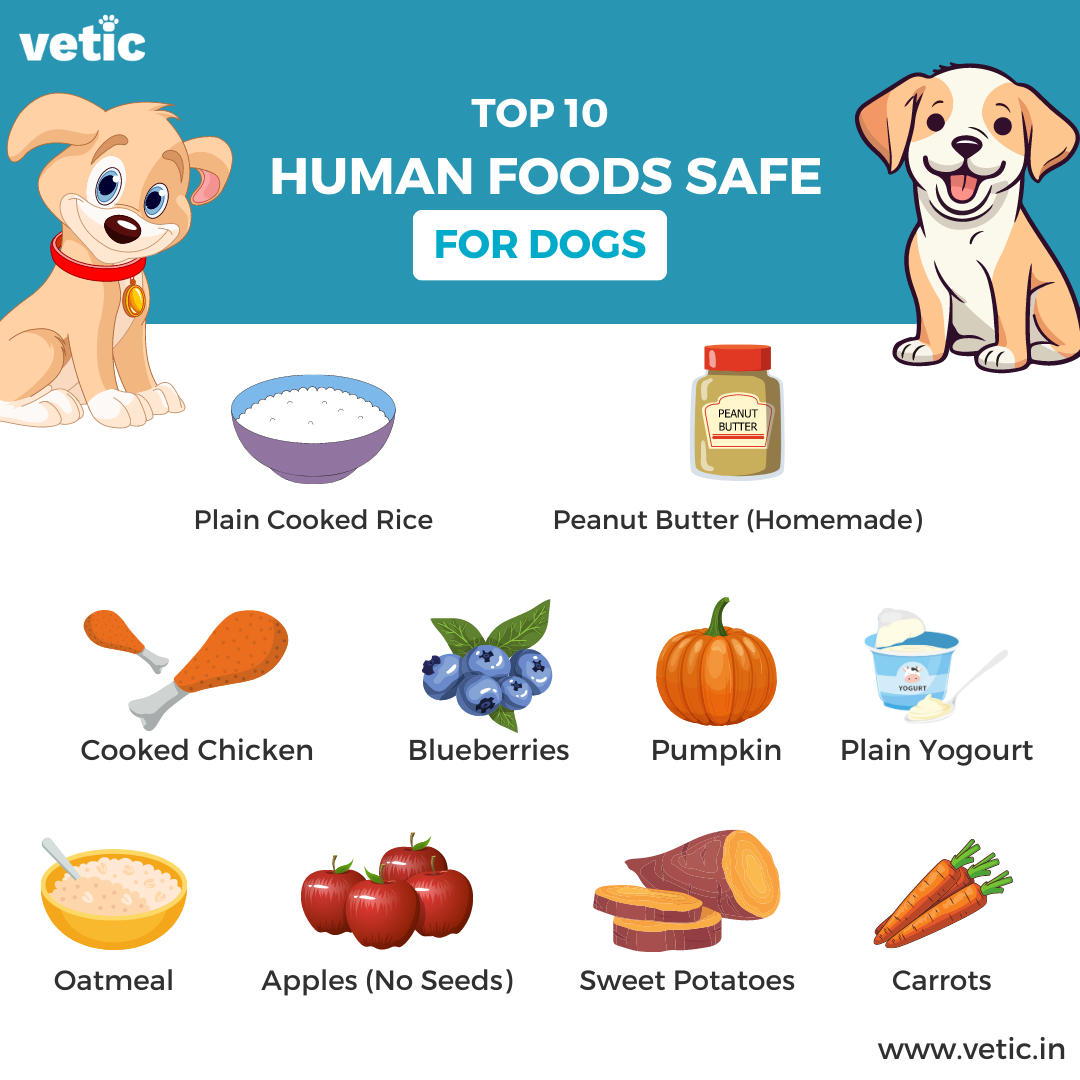When it comes to our furry friends, we all want to spoil them with love and treats. But hold on a second – not all treats are created equal! Some of our common snacks are foods toxic for dogs!
As seasoned dog lovers, we know that some human foods can be a big NO-NO for our four-legged friends.
On the flip side, there are also safe and delicious options that can add a little extra joy to their lives. So, let’s dig in (pun intended) and explore the ins and outs of what’s safe and what’s not in the world of canine cuisine.
The Top 10 Human Foods That Are Toxic to Dogs

- Chocolate: No cocoa for the pups! Chocolate contains theobromine and caffeine, which can send your dog’s heart racing and cause serious trouble. It is one of the most common causes of poisoning (toxicosis) among pet dogs.
- Grapes and Raisins: These harmless and healthy human snacks can lead to kidney failure in dogs. Keep ’em away, no matter how much they give you those puppy eyes.
- Onions and Garlic: Sure, they spice up our curries, but for dogs. Onions and garlic contain disulfides and thiosulfinates. These ingredients are highly toxic for dogs and can damage red blood cells and cause anaemia.
- Avocado: Guacamole is a no-go for dogs. Avocados may be a superfood for humans, but they are superbly toxic for dogs. Avocado contains persin, which can lead to vomiting and diarrhoea.
- Xylitol (Artificial Sweetener): Xylitol is found in sugar-free peanut butter, human snacks and chewing gum. Xylitol is an artificial sweetener that can cause rapid insulin release, resulting in seizures and liver failure in dogs.
- Alcohol: Any form and amount of alcohol is a NO-GO for our four-legged companions. Even a small amount of alcohol can lead to vomiting, loss of coordination, and even coma in pups.
- Coffee: Just like in humans, caffeine can make dogs jittery and anxious. However, in severe cases, it can cause heart palpitations and seizures.
- Macadamia Nuts: Macadamia nuts, commonly found in human snacks, are not at all safe for dogs. Although the exact component that causes toxicosis is unknown, even a small amount can cause weakness, vomiting and hyperthermia in dogs.
- Bones from Cooked Meat: While dogs love to gnaw on bones, cooked ones can break off easily, get stuck in their gums or food pipe and cause internal injuries. Stick to safe, specially-designed chew toys only.
- Raw Eggs: Raw eggs are not recommended for ANYONE. They can contain Salmonella (one of the many harmful bacteria found in eggs), which can lead to gastroenteritis in dogs.
Firstly, keep all human food and snacks away from your dog. Keep your dustbin closed or in a place your dog cannot reach.
Secondly, if your pooch happens to gobble down any of the 10 items mentioned above, it’s time for an emergency vet visit!
The 10 Human Snacks Safe for Dogs

Before we dive in, let’s be clear: your dog’s main diet should come from balanced commercial dog food. Your dog should also receive treats or snacks specially designed to suit the canine digestive system.
However, if you’re a home-cooked food enthusiast, these treats can add a dash of variety to your dog’s palate:
- Carrots: Crunchy and loaded with vitamins like A and K, carrots are great for your dog’s teeth and eyesight. Remember to give them only 2-3 small pieces; that too blanched or boiled.
- Apples (No Seeds): An apple a day keeps the dog doc away! Wash the apple properly. Remove the seeds and core, and let your pup enjoy the fibre and vitamins. You can also boil the apple and mash some of it to make doggy-friendly applesauce.
- Peanut Butter (Homemade): A spoonful of peanut butter is enough to make any puppy happy. Just make sure it’s xylitol-free, as mentioned earlier. Do not add sugar or any other oil. Make sure your dog doesn’t have a peanut allergy before giving them this treat.
- Cooked Chicken: Lean protein heaven! Cooked chicken is safe and protein-packed, giving your dog a boost of energy. Avoid those pesky bones though. PS – when we say “cooked” we mean thoroughly boiled without any condiments and in moderation!
- Blueberries: These little powerhouses are antioxidants in berry form, supporting your dog’s immune system. Do not try to include too many blueberries in one snack or your dog might get an upset tummy!
- Pumpkin: For tummy troubles or a little fibre boost, plain, cooked pumpkin does the trick. Plain cooked pumpkin without any salt or sugar is the perfect fibre supply a pup needs with their home cooked chicken.
- Sweet Potatoes: Packed with vitamins A and C, sweet potatoes are a sweet and nutritious treat. Never give these in the raw form. Boil them thoroughly before chopping or mashing them.
- Plain Yoghourt: Rich in probiotics, plain yoghurt can help with digestion. You can give your pup yoghourt ONLY if your vet approves it. Always go for unsweetened versions. Never opt for sugar-free or flavoured yoghurt. Try making yoghurt at home if your pupper loves it.
- Oatmeal: A cosy treat for chilly days, oatmeal offers fibre and energy. Avoid sugary toppings. Oatmeal is easy-to-digest. You can add bits of chicken, pumpkin and carrots for a colourful and tasty treat.
- Cooked Rice: When tummies are upset, plain cooked rice can be gentle on their digestive system. Plain rice is a miracle on hot and cold days when your dog is having tummy troubles!
And hey, these aren’t just treats, these are proper sources of vitamins, minerals, and other good stuff that your dog needs to thrive.
Takeaway Message:
A balanced diet is key to your dog’s health and happiness. While these tips are helpful, every dog is unique. So, whether you’re dealing with a picky eater or a chowhound, it’s wise to consult a veterinarian near you or a canine nutritionist.
With their guidance, you can ensure that your best friend gets the best possible diet tailored just for them. After all, a happy and healthy dog is the best kind of friend to have by your side.

